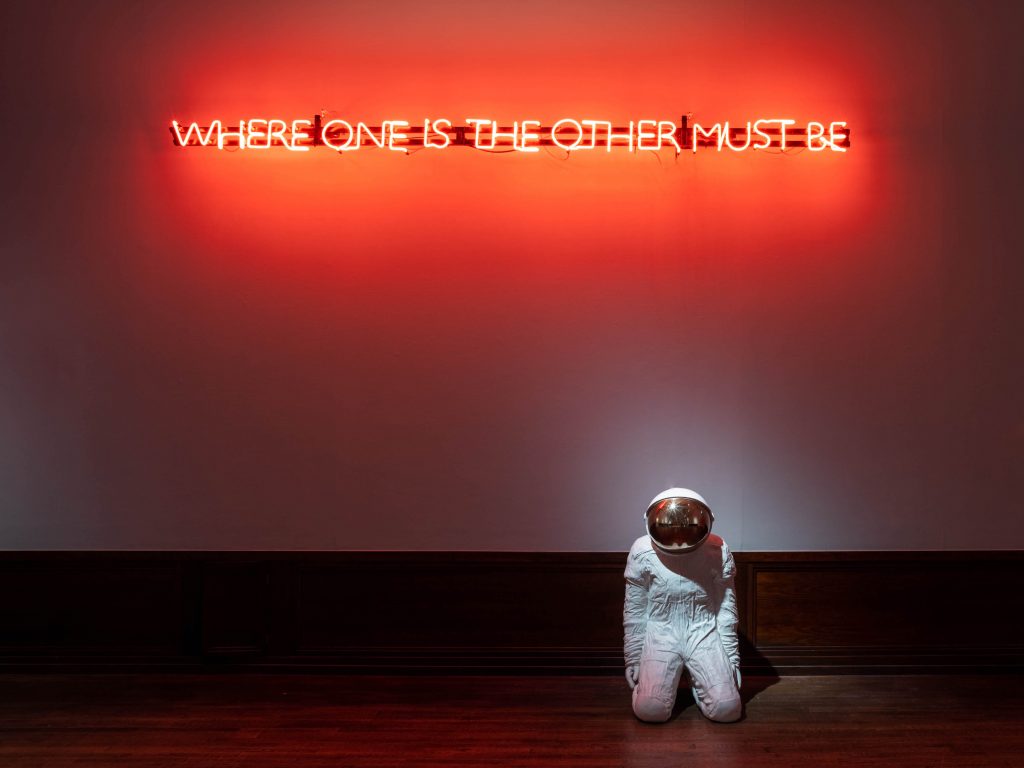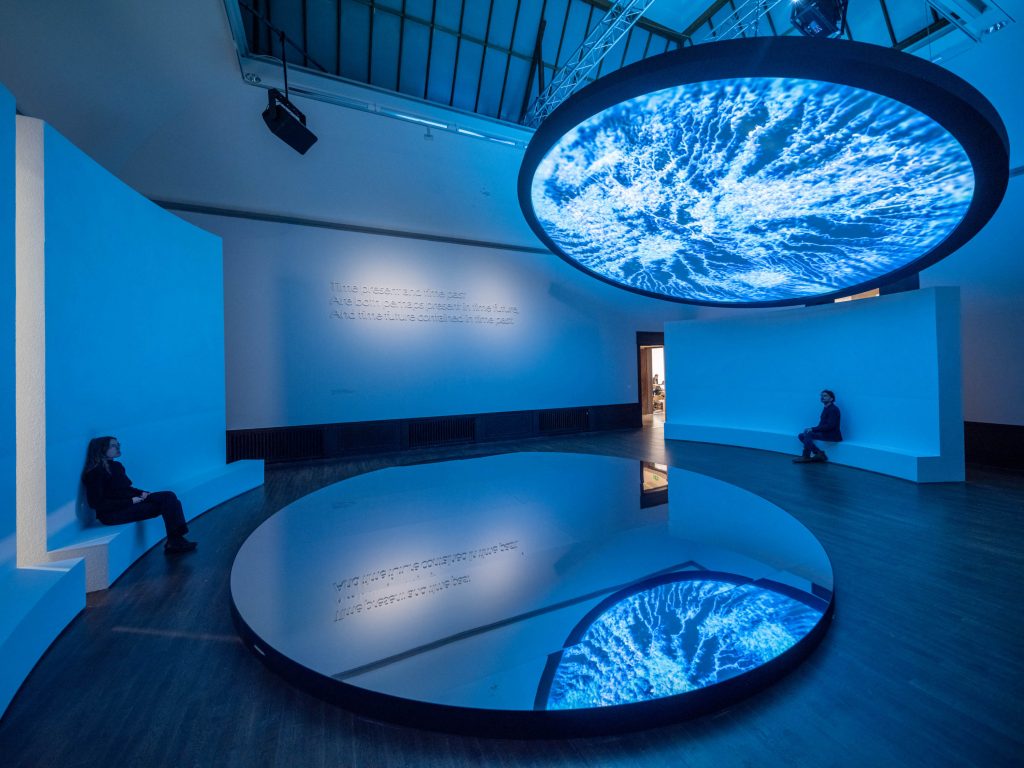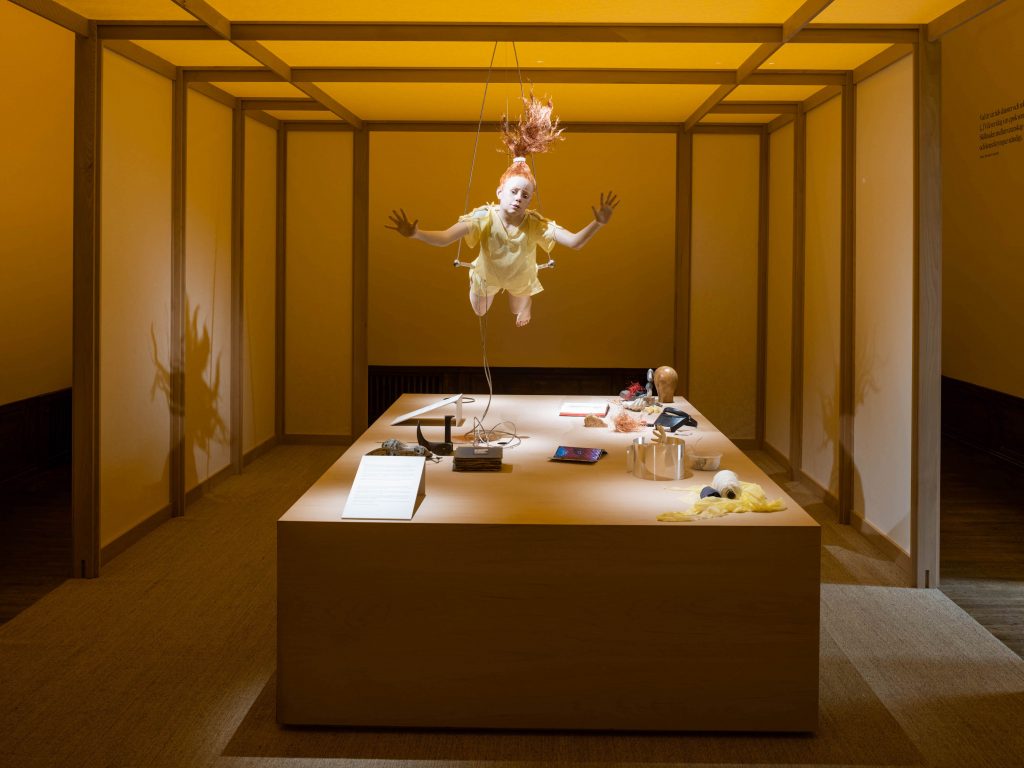
Mats Hjelm, Where one is the other must be, 2014. Jone Kvie, Untitled (carrier), 2006. : © Nobel Prize Outreach. Photo: Jean-Baptiste Béranger
Can we outwit death? That question has been asked for as long as humans have roamed the earth, but modern research shows that the question of eternal life should be viewed not only from as a religious and philosophical matter, but also as a biological possibility.
But while we humans are developing more and more advanced methods to prolong life, for the first time in history we ourselves have the capacity to extinguish all life on earth. Nuclear weapons are not the only threat. Our way of life is destroying the climate and diminishing the chances of future life, day by day.
According to Clara Åhlvik, curator of Life Eternal, the aim of the exhibition is to reflect on issues related to eternity, and thus also the future. “It is more urgent than ever to find new ways of talking about how we should continue our journey. In these discussions, the Nobel Prize can play a key role,” she says.
“This is by far the biggest exhibition project by the Nobel Prize Museum – bringing together science, art and cultural history in a way that is completely new to us,” says Erika Lanner, Director of the Nobel Prize Museum. “It is fantastic to see how relevant and crucial the Nobel Prize is when it comes to issues that many people are thinking about – not least life, death and our future on earth.”
“The Life Eternal exhibition is extremely ambitious, not to say spectacular. It provides a sample of the dynamic that will be possible at a new Nobel Center at Slussen,” says Mårten Castenfors, Head of Liljevalchs. “Put simply: this is what some of the content of the future centre might look like – all for the enjoyment of Stockholm residents and visitors. To me, it goes without saying that Liljevalchs will play a part in helping to define this future.”
Artists Mark Dion, Niki Lindroth von Bahr and Christian Partos have been commissioned to create new works for the exhibition. Oscar Nilsson will also contribute a sculpture of the sickly girl Josie taken from the 2021 novel Klara and the Sun, written by the 2017 Nobel Prize laureate in literature, Kazuo Ishiguro.
-

ARTECHOUSE, Time, Life, and Eternity, 2022. © Nobel Prize Outreach. Photo: Jean-Baptiste Béranger
-

Oscar Nilsson, Josie, 2022. © Nobel Prize Outreach. Photo: Jean-Baptiste Béranger
-
ARTECHOUSE, Time, Life, and Eternity, 2022. © Nobel Prize Outreach. Photo: Jean-Baptiste Béranger
-
Oscar Nilsson, Josie, 2022. © Nobel Prize Outreach. Photo: Jean-Baptiste Béranger
Various issues will be highlighted in the exhibition halls. Visitors will be challenged to think about what happens as we get older and whether it is possible to stop ageing. How our lives and societies are being affected by Artificial Intelligence (AI) technology. Whether there may be a life after this one, or whether parallel worlds exist. In one of the halls, the exhibition will take an in-depth look at why some people put their own lives at risk for a higher purpose.
In one of the rooms at Liljevalchs, visitors will be able to sit down at the desks of some Nobel laureates to learn more about their work processes and creativity. One laureate who will be highlighted is Marie Curie. She succeeded in isolating pure radium that later proved capable of saving lives by means of radiation therapy to combat cancerous tumours. But radiation also posed risks. Marie Curie’s own life was ended by a blood disease that was probably caused by her work with radiation. At peace prize laureate Desmond Tutu’s desk, it will be possible to listen to witnesses from the Truth and Reconciliation Commission that he led after the abolition of apartheid in South Africa.
The following artists are providing works for the exhibition
Anna Dumitriu, Andrea Galvani, Ann Lislegaard, Britta Marakatt-Labba, Christian Partos, Dana Sederowsky, Éva Mag, Fredrik Paulsen, Jone Kvie, Julian Charrière, Laura Splan, Mark Dion, Mats Hjelm, Moa Israelsson, Niki Lindroth von Bahr, Oscar Nilsson, Petra Lindholm, Rineke Dijkstra, Sam Taylor-Johnson, Ulla Wiggen, William Kentridge, Ylva Carlgren, ARTECHOUSE and a joint work by John Wynne and Tim Wainwright.
Creative partners include
Sahara Widoff, Greger Ulf Nilson, Birger Lipinski, Annesofie Becker, Morten Søndergaard, Magnus af Petersens, Matilda Lindvall, Jan Gradvall, Lars Forsberg, YOKE, Transpond, Digizyme, Hangmen, Alnarp Foodtech, AI Sweden, AGoodId, Sveriges Unga Akademi (the Young Academy of Sweden).
About the exhibition
Life Eternal is an unusually boundary-breaching exhibition that sheds light on the crucial issues of our era. The exhibition at Liljevalchs will be the Nobel Prize Museum’s largest ever in Stockholm and can be regarded as a prelude to the new Nobel Center that will be built at Slussen. The exhibition will be on display between 1 October 2022 and 29 January 2023. Read more at https://evigtliv.nobelprizemuseum.se/
Anthology
The exhibition is also accompanied by an anthology with the same name, in which more than 35 writers elaborate on the theme of eternal life. Among those who have contributed essays are Karl Ove Knausgård and Ellen Mattsson. The editors of the book are Clara Åhlvik, Director of Exhibitions at the Nobel Prize Museum, and journalist Jan Gradvall. The book was designed by Greger Ulf Nilson. The anthology is on sale at Liljevalchs and the Nobel Prize Museum.
For further information, please contact
press@nobelprize.org
Press images
Images can be accessed online at https://nobelprize.org/press-images-life-eternal
About the Nobel Prize Museum
The Nobel Prize shows that ideas can change the world. The courage, creativity and perseverance of the Nobel Laureates inspire us and give us hope for the future. Films, in-depth tours, and artefacts tell the stories of the Laureates and their contributions ‘for the greatest benefit to humankind’. Based on the Nobel Prize’s unique combination of fields – natural sciences, literature and peace – we examine the greatest challenges of our time and show how we can respond to them through science, humanism and collaboration. With our exhibitions, school programmes, lectures and conversations, we at the Nobel Prize Museum strive to engage the public in making a better world. Today we are located at Stortorget in Gamla Stan, Stockholm’s Old Town district. We are planning to create a new home for Nobel Prize public outreach activities at Slussen in central Stockholm.